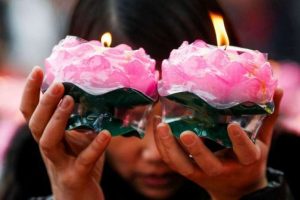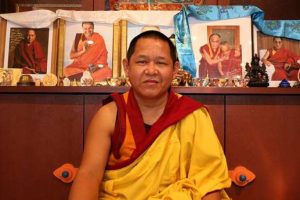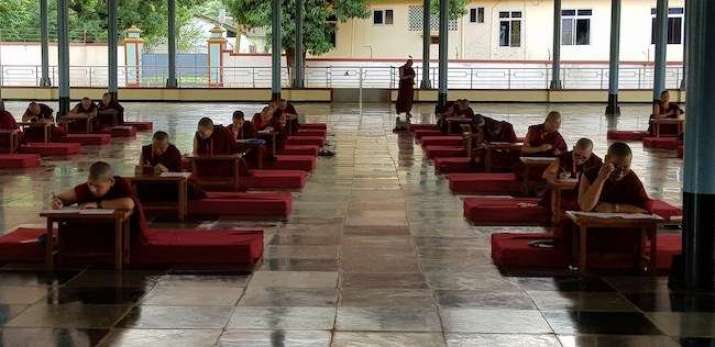
More than 50 Tibetan Buddhist nuns today come to the end of a grueling examination schedule they have undertaken as the culmination of years of study toward a geshema degree. From 1–12 August, 51 Tibetan Buddhist nuns sat various levels of the geshema examinations at Jangchup Choeling Nunnery in southern India.
The geshema degree is the highest degree in Gelugpa tradition and was only recently made available to Buddhist nuns.* Like the geshe degree for male monastics, it is roughly equivalent to a PhD in Tibetan Buddhist studies. The rigorous exams take four years to complete, with one set held each year. In the last two years, 26 Tibetan Buddhist nuns have earned this degree.
According to the Tibetan Nuns Project, 24 nuns are taking their first-year exams this month, with nine nuns doing their second-year exams, 11 nuns doing their third-year exams, and seven geshema candidates doing their fourth and final year of examinations** at Jangchup Choeling Nunnery in Mundgod, a small town in the Indian state of Karnataka.
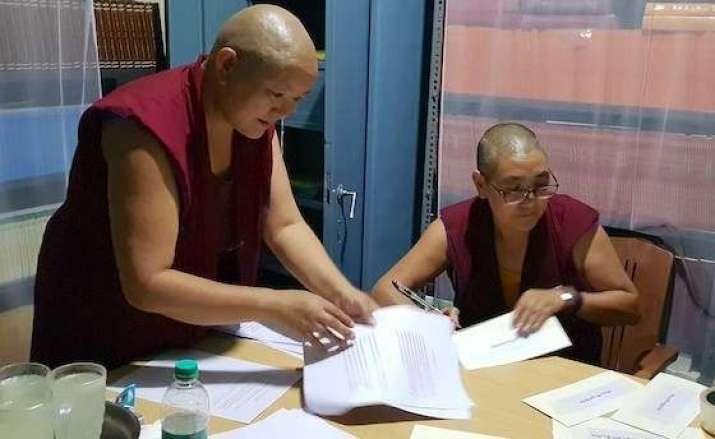
If all of the students do well, there will be seven new geshema graduates this autumn, who will pave the way for other nuns to follow in their stead. The degree will make them eligible to take on key leadership roles in their monastic and lay communities that are reserved for degree holders and were therefore previously unavailable to women. Recently, two geshemas were hired as teachers at Dolma Ling Nunnery and Institute.***
The graduation ceremony will be held at the end of the 2019 Jang Gonchoe Inter-nunnery Debate in November.
The title geshe was first bestowed upon masters of the Kadampa tradition, such as Geshe Chekawa Yeshe Dorje (1102–76). The degree represents the highest form of training in the Gelugpa school of Tibetan Buddhism. The first female monastic to qualify for the geshema title was German nun Kelsang Wangmo, who was ordained in India and spent 21 years in training before receiving the Geshema title in 2011.
Candidates for the geshema degree are examined on the entirety of their 17-year course of study of the five great canonical texts. They must achieve a score at least 75 per cent during their studies to be eligible to sit for the geshema exams. On 22 December 2016, His Holiness the Dalai Lama, who has long advocated a geshema program for nuns, awarded 20 Tibetan Buddhist nuns with geshema degrees at a graduation ceremony held at Drepung Monastery in Mundgod. ****
The nuns are required to take written tests and oral examinations in the form of traditional Tibetan Buddhist debate. The debates last four hours in the morning (8am–12pm) and four hours in the afternoon (2pm–6pm). The nuns draw slips of paper that lists three topics from a particular subject. Each nun must choose one of the three options and debate on that. The nuns are given 15 minutes for each debate.
In the lead-up to this year’s examinations, Geshe Jampa Kalden, khenpo of Geden Choeling Nunnery and head of the geshema examination committee, explained the examination rules and advised the nuns to remain calm and collected while taking their exams—urging them not to rush and not to hurry to submit their answer sheets just because other people may have already done so.
Heartfelt messages of support for the nuns have poured in from supporters of the Tibetan Nuns Project, including one from “Alan,” who has sponsored two nuns:
Dear Geshema Candidates: You are not only contributing to the survival and expansion of Tibetan Buddhism, but you are all changing the world and making it a better place by means of your studies, self-transformation, compassion, and example. Thank you all and good luck. You are in our prayers. We look forward to the day when the two nuns who we sponsor take their Geshema exams. Blessings. (Tibetan Nuns Project)
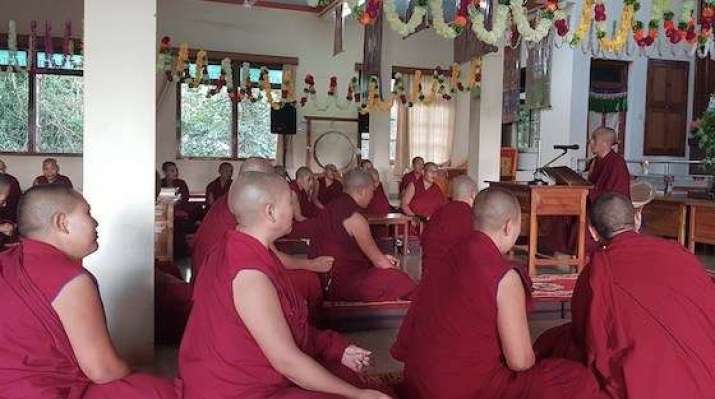
The Tibetan Nuns Project provides education and humanitarian aid to refugee nuns from Tibet and Himalayan regions of India. Established under the auspices of the Tibetan Women’s Association and the Department of Religion and Culture of the Central Tibetan Administration, it supports hundreds of nuns from all Tibetan Buddhist lineages living in nunneries and elsewhere in India. Many of the nuns are refugees from Tibet, but the organization also reaches out to the Himalayan border areas of India where women and girls have had little access to education and religious training.
* The Central Tibetan Administration reached this unanimous and historic decision on 19 May 2012 after a two-day meeting in Dharamsala attended by high lamas, representatives of nuns from six nunneries, and members of the Tibetan Nuns Project.
** There were originally eight nuns, but one dropped out at the end of July due to stress.
*** In Historic First, Two Tibetan Buddhist Nuns Hired to Teach Buddhist Philosophy (Buddhistdoor Global)
**** Dalai Lama Awards Historic Geshema Degrees to 20 Nuns (Buddhistdoor Global)
See more
Over 50 Tibetan Buddhist nuns take their Geshema exams (Tibetan Nuns Project)
Tibetan Nuns Project
The Pema Chodron Foundation








